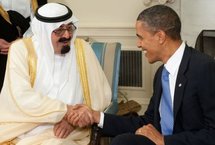
Saudi King Abdullah (left) shakes hands with US President Barack Obama.
Abdullah, 86, arrived at the White House just a week before Obama is due to welcome Israeli Prime Minister Benjamin Netanyahu, following Israel's decision to allow some "civilian" goods into Gaza in the wake of its deadly flotilla raid.
Obama, who pushed for such a step, may try to use the Israeli move as a spur to intensify US-brokered indirect talks between Israel and the Palestinians, as he seeks to open a direct channel between the two sides.
Given a grim year, the president was surprisingly upbeat when he met Palestinian leader Mahmud Abbas this month, saying he believed progress was possible in the Middle East before the end of the year.
Abdullah and Obama met a year ago in Riyadh, the day before the US leader's landmark address to the Muslim world, at a time when Washington was seeking inducements to Israel from the Arab world to prod peace moves forward.
Those movements were not forthcoming, and Obama's own relationship with Israel has since deteriorated -- though both the Netanyahu and US governments now seem keen to patch up their public rift over settlement building.
Obama held a working lunch with the king at the White House, before huddling in Oval Office talks with his visitor.
Analysts said the Saudis would be keen to talk about US-driven new nuclear sanctions over Iran, the Middle East peace process, and Afghanistan.
Saudi Arabia sees the Iranian nuclear challenge as a key foreign policy threat, and have also registered concern about the US posture in the Middle East and Gulf when American troops withdraw from Iraq.
Washington may want the Saudis to do more to use its influence to get rival factions in Afghanistan to unite, or talk peace with the government, and both sides have strong concerns over instability in Yemen.
The two sides could also agree on arms deals to build Riyadh's defensive capabilities against Iran's threat, including a long-pending request for as many as 72 F-15 Eagle tactical fighters, according to defense industry sources.
The Saudis have long linked achieving a Palestinian-Israeli peace deal to alleviating other regional tensions, including the perceived threat from arch-rival Iran.
-------------------------------------------------------------------------------
Obama, who pushed for such a step, may try to use the Israeli move as a spur to intensify US-brokered indirect talks between Israel and the Palestinians, as he seeks to open a direct channel between the two sides.
Given a grim year, the president was surprisingly upbeat when he met Palestinian leader Mahmud Abbas this month, saying he believed progress was possible in the Middle East before the end of the year.
Abdullah and Obama met a year ago in Riyadh, the day before the US leader's landmark address to the Muslim world, at a time when Washington was seeking inducements to Israel from the Arab world to prod peace moves forward.
Those movements were not forthcoming, and Obama's own relationship with Israel has since deteriorated -- though both the Netanyahu and US governments now seem keen to patch up their public rift over settlement building.
Obama held a working lunch with the king at the White House, before huddling in Oval Office talks with his visitor.
Analysts said the Saudis would be keen to talk about US-driven new nuclear sanctions over Iran, the Middle East peace process, and Afghanistan.
Saudi Arabia sees the Iranian nuclear challenge as a key foreign policy threat, and have also registered concern about the US posture in the Middle East and Gulf when American troops withdraw from Iraq.
Washington may want the Saudis to do more to use its influence to get rival factions in Afghanistan to unite, or talk peace with the government, and both sides have strong concerns over instability in Yemen.
The two sides could also agree on arms deals to build Riyadh's defensive capabilities against Iran's threat, including a long-pending request for as many as 72 F-15 Eagle tactical fighters, according to defense industry sources.
The Saudis have long linked achieving a Palestinian-Israeli peace deal to alleviating other regional tensions, including the perceived threat from arch-rival Iran.
-------------------------------------------------------------------------------









 Home
Home Politics
Politics









